Finding the right class action lawsuit attorneys can be the deciding factor between a successful case and a disappointing settlement. The best attorneys bring specialized experience, a strong reputation, and a knack for winning. But how do you separate true expertise from the rest? It’s all about knowing where to look—from credentials and bar memberships to specialized certifications and client reviews.
At Sparrow, we know that expertise matters. With our resources, you can easily verify the credentials of class action lawsuit attorneys, check their case history, and even gauge their standing within the legal community. Whether it’s a consumer protection claim or a data breach case, Sparrow is here to help you sort the legal talent from the legal talk.
Backed by Sparrow’s decades of experience, we’ve outlined clear steps for reviewing a class action attorney’s background. Learn how to check licensing, assess past case results, and gauge client satisfaction—ensuring you select the right legal partner for your case.
Let’s get started!
Understanding Attorney Credentials
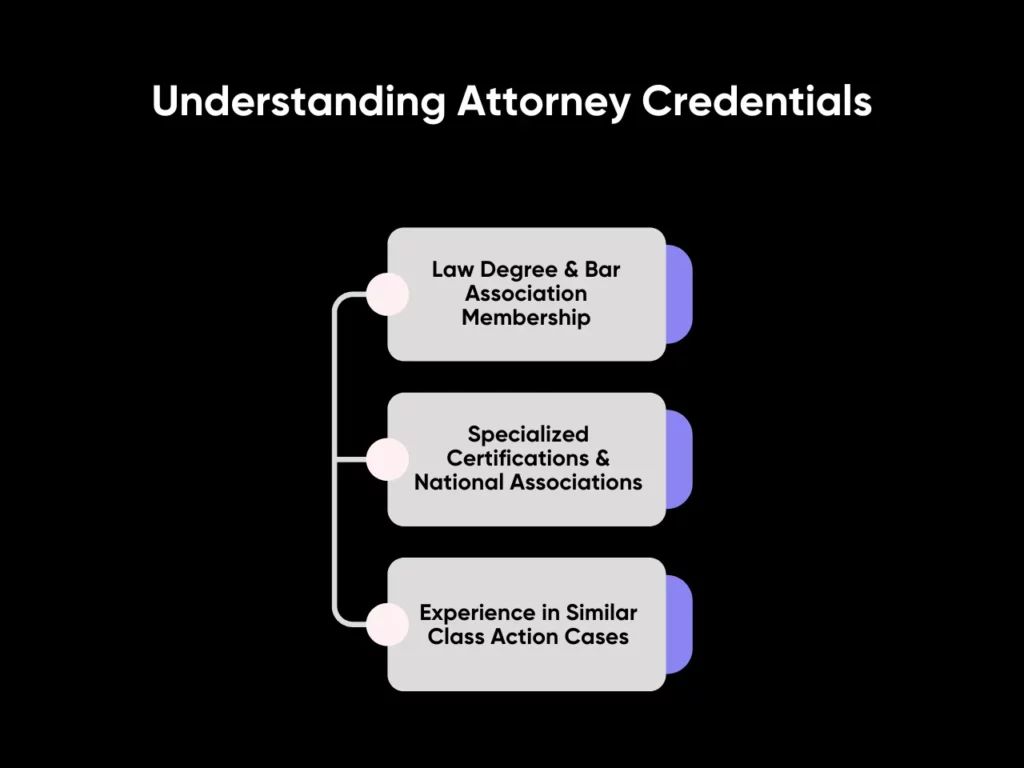
Choosing qualified class action lawsuit attorneys is essential to securing fair compensation. The right attorney brings specialized experience, proven case success, and a strong reputation. You can find reliable representation to guide you confidently through complex class action proceedings by verifying credentials, assessing experience, and consulting client reviews.
When choosing a lawyer, some credentials are essential to look into. Here’s how to find a lawyer for a class action lawsuit:
Law Degree and Bar Association Membership
Reputable class action lawsuit attorneys will have law degrees from accredited institutions. While this is foundational, bar association membership is equally vital. Attorneys must pass the bar exam to practice law, and this requirement varies by state. Beyond passing the bar, attorneys must also uphold a professional code of ethics and maintain good standing with their state bar association. To verify a lawyer’s standing, you can check most state bar websites, which offer tools for confirming licensure status and reviewing disciplinary actions.
Specialized Certifications and National Associations
Some class action lawsuit attorneys hold certifications indicating expertise in class action litigation or trial advocacy. National organizations like the American Association for Justice (AAJ) or the National Association of Consumer Advocates (NACA) provide certifications and resources that validate an attorney’s focus on class actions and consumer protection. Attorneys who are members of these associations commit to ethical standards and often pursue continuing education to stay up-to-date with the latest litigation strategies and regulatory changes.
Experience in Similar Class Action Cases
Look for attorneys with experience in cases similar to your own. For instance, an attorney with a background in data privacy lawsuits might not be the best fit for a workplace discrimination case. Prior success in consumer rights, product liability, or environmental law indicates that the attorney is familiar with the nuances of those areas and can effectively address the unique challenges they bring.
Legal Resources for Verifying Credentials
In addition to basic checks, here are some of the most invaluable resources that allow you to dive deeper into an attorney’s credentials and track record:
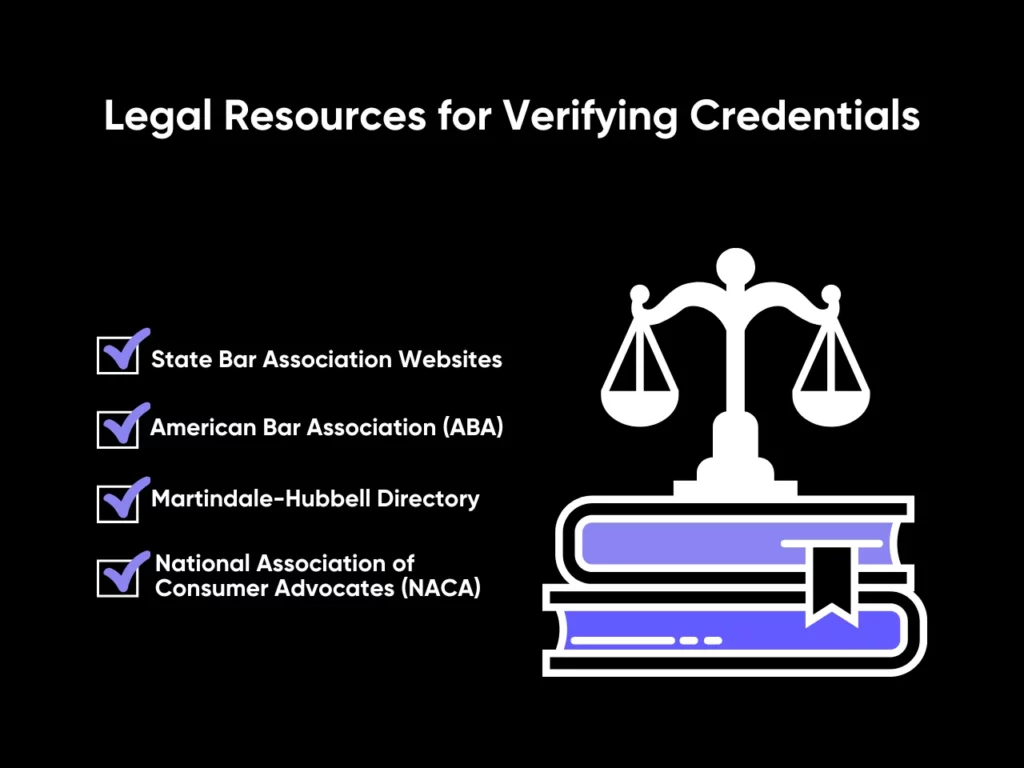
- State Bar Association Websites: Many state bar associations allow you to check an attorney’s license status, disciplinary record, and any grievances filed against them.
- American Bar Association (ABA): The ABA does not certify attorneys but offers resources for checking an attorney’s legal background and any association memberships they may have.
- Martindale-Hubbell Directory: This directory lists class action lawsuit lawyers along with ratings based on peer reviews, showcasing how the legal community perceives their skills and ethical standards.
- National Association of Consumer Advocates (NACA): NACA’s attorney directory allows you to find lawyers who focus on consumer protection and are committed to high ethical standards. Membership is a sign of specialization and adherence to ethical practices.
Investigating Reputation and Client Reviews
Client testimonials offer insight into how an attorney engages with clients, communicates, and handles class actions. Here’s how to analyze these reviews for meaningful insights:
Online Review Platforms and Ratings
Review platforms like Avvo, Martindale-Hubbell, and Justia publish client feedback along with ratings based on peer and client reviews. On Martindale-Hubbell, for example, you may see a rating of “AV Preeminent,” which signifies top-tier legal skill and ethical practice. Ratings like these are especially valuable as they are derived from input from fellow attorneys. Avvo also includes client ratings that cover various aspects of service, from responsiveness to transparency.
How to Interpret Reviews
While reading reviews, look for trends in client feedback. A recurring theme of clear communication, prompt response times, and regular updates suggests a lawyer who values client relations. Be cautious if multiple reviews mention issues with transparency, lack of communication, or negative case outcomes.
Consulting Professional References
In addition to client reviews, recommendations from other attorneys are valuable. An endorsement from another lawyer specializing in class actions is a strong indicator of trust and respect in the legal community. You can often find these endorsements on the lawyer’s website or in legal directories.
Checking the Attorney’s Success Rate and Settlement Outcomes
Evaluating an attorney’s success rate in class action cases provides insight into their experience and ability to secure favorable results. Here’s how to assess this crucial factor:
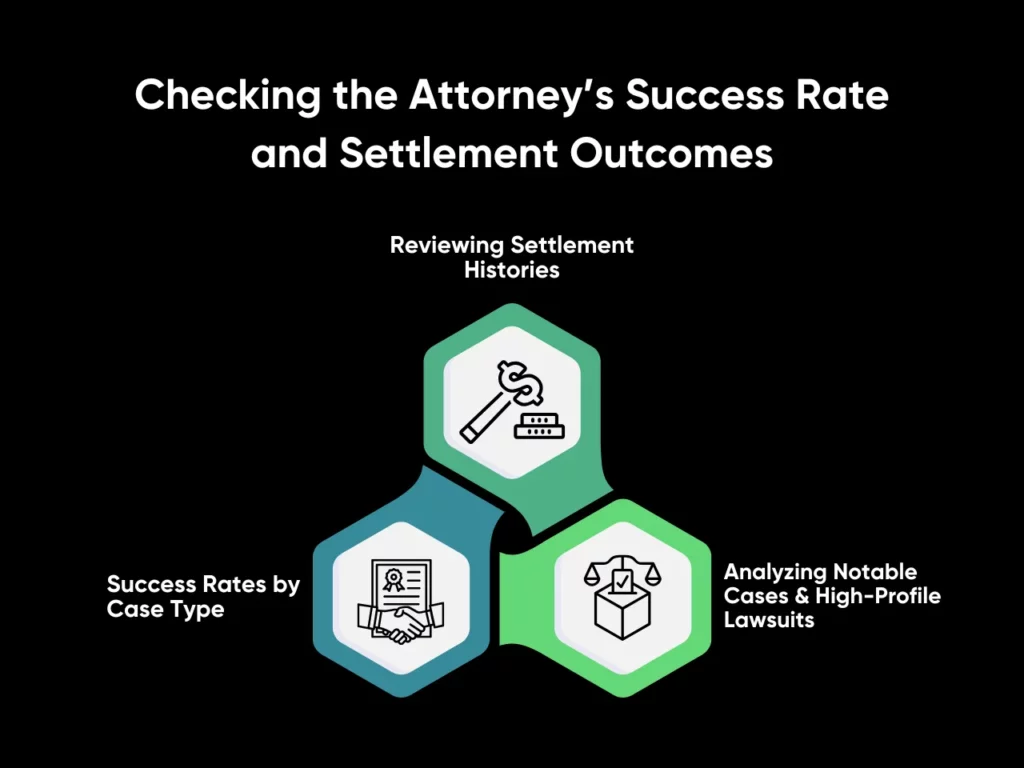
Reviewing Settlement Histories
A strong settlement history demonstrates an attorney’s ability to negotiate substantial compensation for clients. When looking for an attorney, prioritize those who have successfully secured high-value settlements in cases similar to yours. For example, class action lawsuit attorneys who’ve led consumer safety lawsuits or privacy violation cases with strong results typically have excellent negotiation skills and a reputation for effectively advocating on behalf of class action plaintiffs. Large settlements often reflect a combination of legal acumen, negotiation power, and dedication to maximizing compensation for members of the class.
Analyzing Notable Cases and High-Profile Lawsuits
Attorneys with experience in high-profile cases often bring a strategic advantage, especially in managing large groups of people and navigating media attention. For example, those who handled cases like the Jif peanut butter recall or Unilever’s Suave antiperspirant lawsuit show skill in managing complex litigation involving public scrutiny. Reviewing an attorney’s role and achievements in notable cases can help you understand their approach to large-scale litigation and their success in securing fair outcomes for clients.
Success Rates by Case Type
Class action cases vary widely, and success in one area doesn’t necessarily translate to another. Look for attorneys who have a proven record in your specific area of need. For example, if your case involves a personal injury case against a large company, seek out class action lawsuit attorneys with a history of victories against powerful corporations. This specialization ensures they understand the specific evidence, regulatory landscape, and common challenges associated with your case type.
Taking the time to thoroughly evaluate your options will pay off in the long run, empowering you with the support and skills necessary to navigate your class action case confidently.
Different Types of Class Action and Attorney Specialization
Class actions cover a wide range of legal areas, each requiring unique expertise. Here are a few main types and considerations when choosing the right attorney for each:
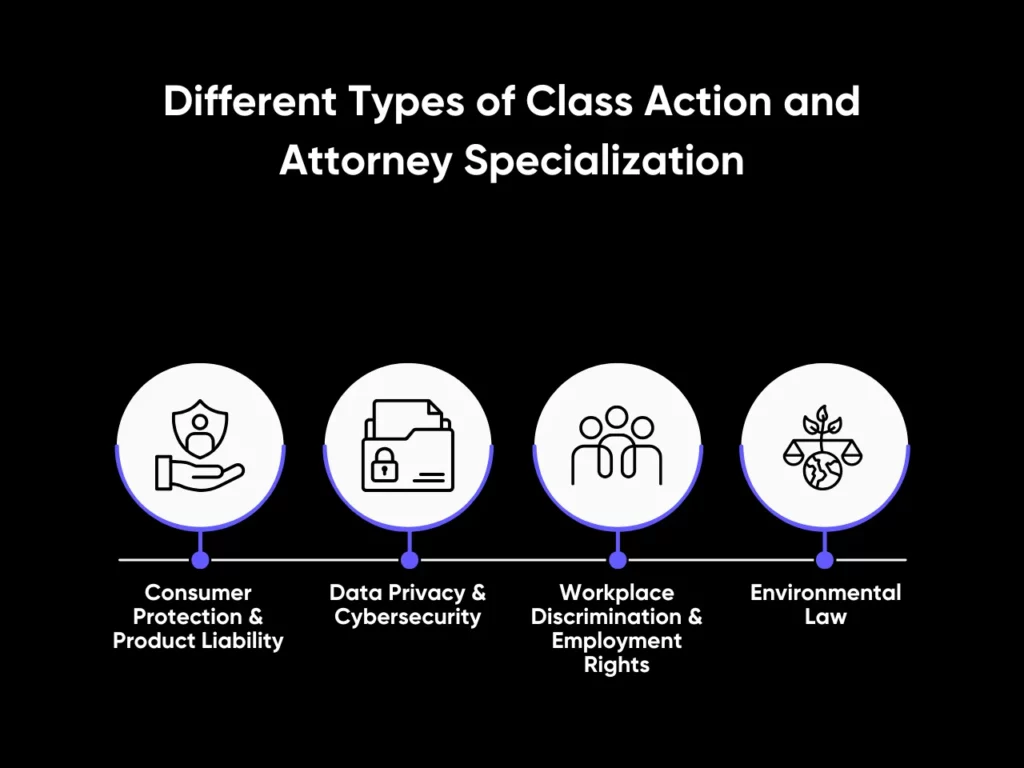
Consumer Protection and Product Liability
These cases typically involve lawsuits against corporations accused of selling defective or dangerous products, false advertising, or violating consumer safety standards. Attorneys specializing in this area should have a firm grasp of consumer protection laws and the ability to negotiate with corporate legal teams, as these cases often result in high-value settlements. Their experience in previous product recalls or consumer fraud cases can be invaluable.
Data Privacy and Cybersecurity
In cases involving data breaches or unauthorized data sharing, attorneys need expertise in digital privacy laws, such as the California Consumer Privacy Act (CCPA) or HIPAA for health data. They should also understand the technical aspects of data breaches to help establish negligence. Experience in representing lead plaintiffs in cases involving large-scale breaches and data misuse can be crucial for securing compensation for affected consumers.
Workplace Discrimination and Employment Rights
Employment-related class actions often address discrimination, wage disputes, or hostile work environments. These cases require attorneys well-versed in federal and state labor laws, such as Title VII of the Civil Rights Act and the Fair Labor Standards Act (FLSA). An attorney with experience working alongside labor boards and handling sensitive employment matters is essential for managing complex employment disputes involving several plaintiffs.
Environmental Law
Environmental class actions often target corporations responsible for pollution, toxic waste, or contamination affecting communities. Attorneys specializing in environmental law should be knowledgeable about key regulations, such as the Clean Air Act or the Clean Water Act, and comfortable working with environmental scientists or toxicologists. This expertise helps them build robust cases for class members affected by environmental hazards.
Choosing a class action lawsuit attorney with specific experience in the type of lawsuit you’re involved in can significantly enhance your chances of success. Each area has unique legal standards, evidence requirements, and complexities, so working with an attorney who understands the specific challenges of your case type is invaluable.
Verifying Professional Standing and Legal Background
Before finalizing your choice, confirm that your attorney has no disciplinary history and maintains ethical standards:
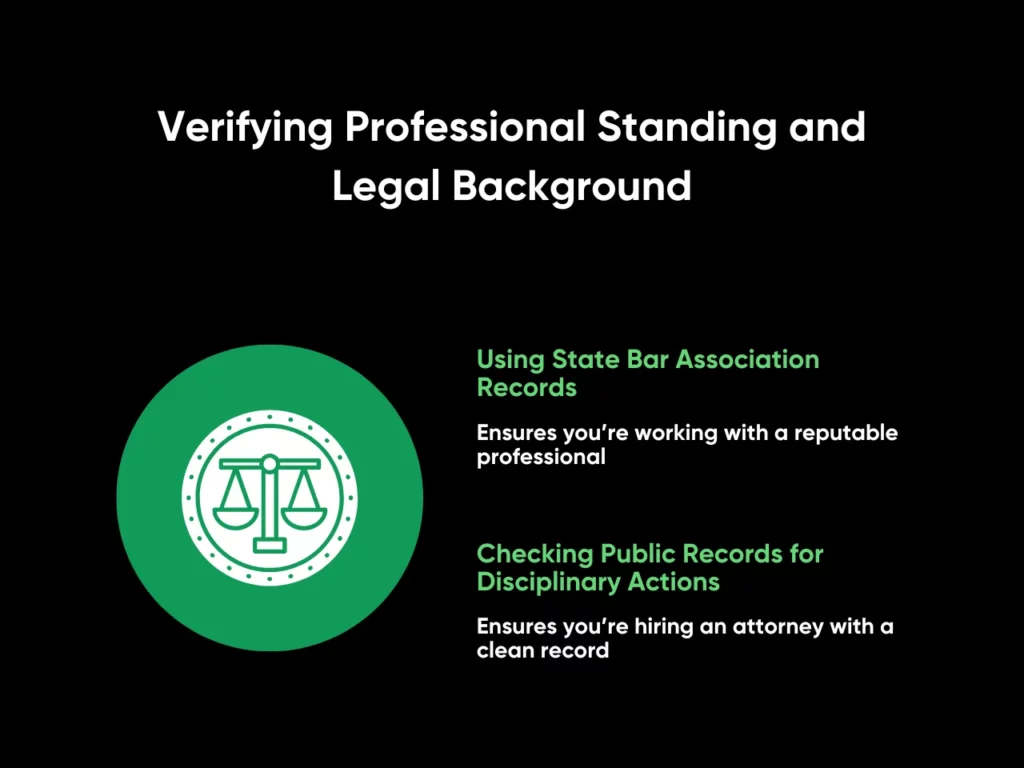
- Using State Bar Association Records: State bar associations maintain a record of each attorney’s licensing status and disciplinary actions. Verifying an attorney’s record with the state bar association ensures you’re working with a reputable professional.
- Checking Public Records for Disciplinary Actions: Court and bar association disciplinary records are available for public review. Reviewing these ensures you’re hiring an attorney with a clean record, and any history of misconduct could raise red flags about their professionalism and reliability.
Understanding Costs and Fee Structure
Class action fees can vary, and knowing what to expect can help you make the right choice.
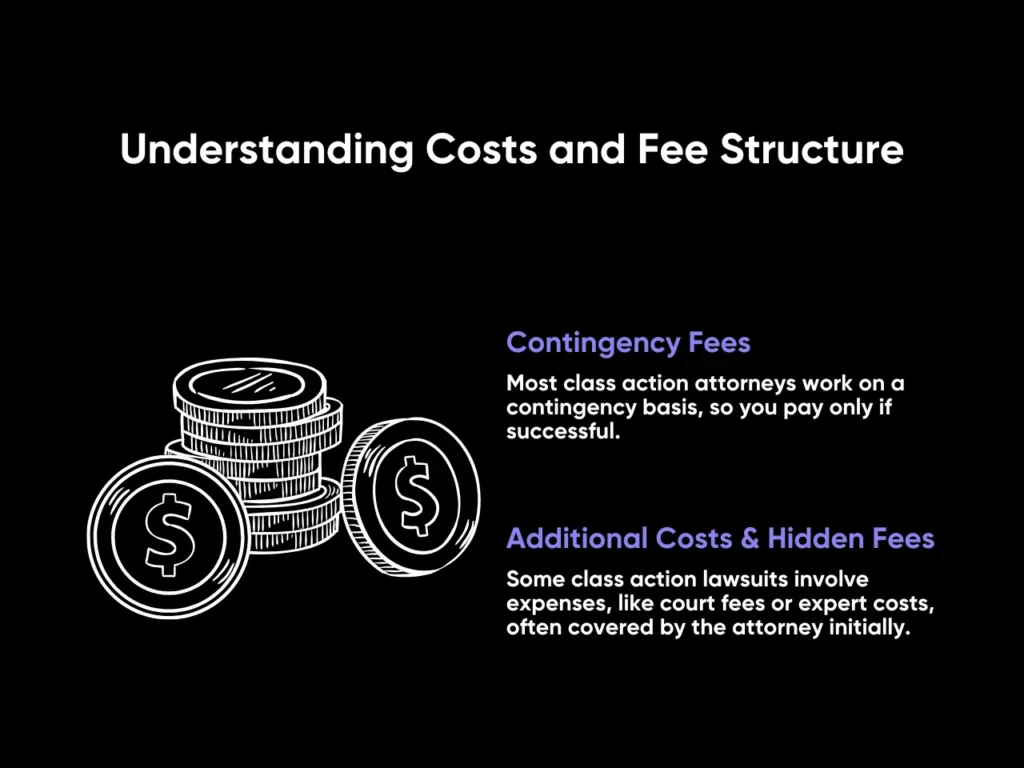
- Contingency Fees: Most class action lawsuit attorneys work on a contingency fee basis, meaning you only pay if the case is successful. This reduces upfront costs and makes class actions accessible to many clients.
- Additional Costs and Hidden Fees: Certain class action lawsuits involve expenses like court fees or expert witness costs, often covered initially by the attorney. Ensure the fee agreement is clear about any additional expenses deducted from your settlement.
Key Takeaway
Looking for class action lawsuit attorneys? In a field crowded with flashy credentials, finding one who actually delivers can feel like searching for a needle in a legal haystack. From bar memberships to specialized certifications and client reviews, knowing what to look for can be the difference between a win and a letdown.
So, how do you spot the real deal? Start by digging into their track record: What kinds of cases have they taken on—and won? Are their clients singing their praises or warning others to steer clear? The right law firm brings a wealth of experience in legal issues concerning similar injuries as your putative legal action, whether you’re dealing with mass tort litigation, defective products liability, or consumer fraud.
Ready to cut through the noise? Sparrow’s done the vetting for you, connecting you with trusted, battle-tested attorneys who bring serious expertise to the table. Reach out today and explore Sparrow’s blogs for more insights—your guide on how to find a class action lawyer who’s truly ready to take on your case with skill and dedication.


